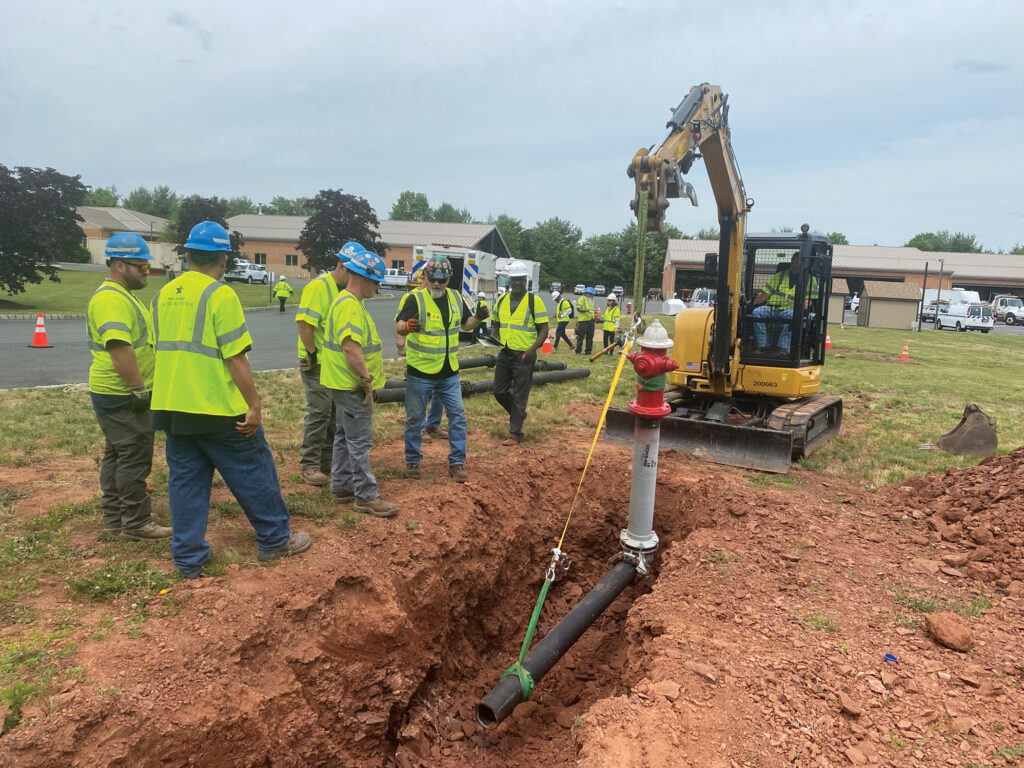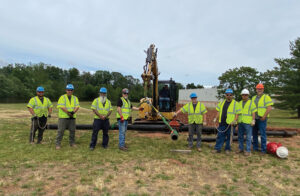 Hoisting and rigging represent some of the most perilous tasks performed by UWUA members, whether they are involved in gas, electric, or water-related work. While the Occupational Safety and Health Administration (OSHA) doesn’t mandate riggers to be certified, they do need to be qualified.
Hoisting and rigging represent some of the most perilous tasks performed by UWUA members, whether they are involved in gas, electric, or water-related work. While the Occupational Safety and Health Administration (OSHA) doesn’t mandate riggers to be certified, they do need to be qualified.
Local 423, which represents 250 workers at New Jersey American Water, regularly deals with hoisting and rigging as they install and maintain water lines and operate a wastewater treatment plant in the central part of the state. To enhance job safety, Mike Esposito, the local president, initiated a program at NJ American Water to equip his members with a deeper understanding of the rigging process.
The program’s success has been so pronounced that American Water intends to implement it for employees in other parts of the country.
It came about when Esposito returned to the field post-COVID. “I came back as a job foreman and saw a gap in the training being done on rigging.” To fix it, he reached out to John Healy, who runs American Side Rigging. Healy is a member of New York City Ironworkers Local 40, whose members are renowned for their expertise in securing and lifting heavy pipes, beams, and other materials.
Esposito and Healy worked to create a training program specific to the needs of Local 423 members. The plan was rolled out in June. American Water’s safety director immediately endorsed it, noting its comprehensiveness compared to other programs she had reviewed.
“Utility workers — whether water, gas or electric — all use hoisting and rigging and need to know the proper procedures to avoid accidents and stay safe,” Esposito said.
Local 423’s course involves one full day of training, with an hour and a half in a classroom. The rest is hands on. The June session trained 10 members. “The trainer runs through it and shows members exactly the proper placement — how to lift, how to pick, how to weigh, how to measure, how to set up the job safely, develop a picking plan and a rigging plan,” said Esposito. Members then get to try it themselves and do it multiple times under the supervision of the trainer.
The program caught the attention of UWUA’s National Safety Director Scotty MacNeill, who praised Esposito’s initiative and his efforts to introduce it to other locals. “Mike was able to share this training not just in-house with his local, but he branched out,” said MacNeill. Safety committee members from Local 335 at Missouri American Water and Ronnie Brooks of Long Island Local 393 (which represents Suffolk County Water Authority workers) observed the June training session. Brooks is the Water Subchair of the National Safety Committee.
The UWUA has five locals with American Water in New Jersey. “Everyone in New Jersey is going to get trained and they’re going to bring it to other states as well. Ultimately, I think American Water may train hundreds of people with this training we developed,” said Esposito.
By the end of October, all of Local 423’s field workers had been trained, as had those represented by Local 395 in Shrewsbury, NJ. Workers at the company’s Howell and Lawnside facilities, who are represented by other unions, were also trained. In December, Healy traveled to Missouri to train field members at Local 335.
Esposito said his members working in production will also take a course, as rigging skills are used at treatment facilities to lift engines and other heavy items. He and Healy are in the process of developing a program more specific to the needs of that group and expect to have it ready to launch in early 2024.
For more information, contact National Safety Director Scotty MacNeill, john.macneill@uwua.net.

